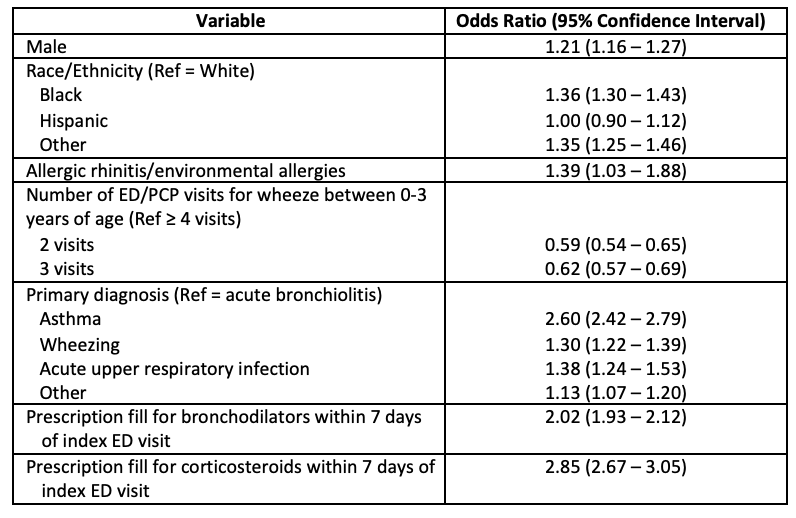Asthma
Asthma 1
357 - Factors Associated with Development of Asthma in Young Children with Recurrent Wheeze in the Emergency Department
Publication Number: 357.302

Isabel Jennifer Hardee, MD (she/her/hers)
Resident Physician
University of Colorado School of Medicine
Denver, Colorado, United States
Presenting Author(s)
Background:
Recurrent wheezing episodes are common in the first several years of life, with many young children progressing to a diagnosis of asthma in later childhood. Factors associated with development of asthma in children with recurrent wheeze must be further elucidated.
Objective:
To describe clinical characteristics of young children presenting to the emergency department (ED) for recurrent wheeze, and to determine factors associated with subsequent diagnosis of asthma.
Design/Methods:
Retrospective cohort study of Medicaid-enrolled children between 0-3 years of age with an index ED visit for wheeze (i.e., wheeze, bronchiolitis, asthma) between 2009 and 2013, and at least one prior documented episode of wheezing diagnosed in an ED or primary care provider (PCP) office. Children with complex chronic conditions, aspiration pneumonia, prematurity or alternative etiology of wheeze (e.g., anaphylaxis) were excluded. The primary outcome was documented diagnosis of asthma between 4-6 years of age. Asthma was defined as either ED or PCP visit with an ICD-9/10 diagnosis of asthma, two or more prescription fills of a short-acting beta-agonist, or one or more prescription fills of other asthma medication (e.g., long-acting beta-agonist, inhaled corticosteroid). Demographics, season of index ED visit, medications administered, and prescription fills within 7 days were assessed. Overall rate of asthma diagnosis in children with recurrent wheeze was determined. Multivariable logistic regression was used to determine factors associated with future diagnosis of asthma.
Results:
Between 2009-13, a total of 41,710 children presented to the ED for recurrent wheezing. Mean age was 1.3 years; 59% percent were male, 42% Black, and 6% Hispanic (Table 1). At index ED visits, the most common diagnosis was acute bronchiolitis (40%) and 77% of children received a prescription for corticosteroids. Between 4-6 years of age, 11,708 (28%) children had a documented diagnosis of asthma. In multivariable regression, future development of asthma was associated with male sex, Black race, history of allergies, greater number of visits for wheeze, index ED visit diagnosis of asthma and prescription for bronchodilators or corticosteroids (Table 2).
Conclusion(s):
In young Medicaid-enrolled children with recurrent wheeze presenting to the ED, male sex, Black race, and prescription for bronchodilators and corticosteroids are associated with future development of asthma. These findings have the potential to aid in early detection and treatment of asthma in high-risk young children with recurrent wheeze..png)

